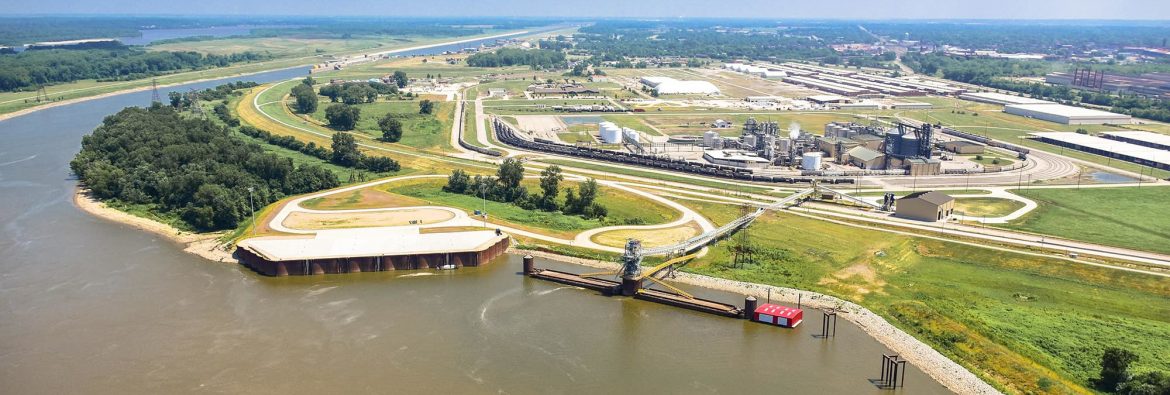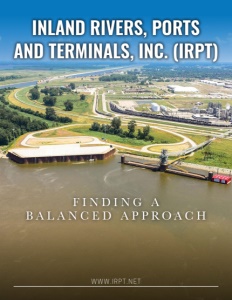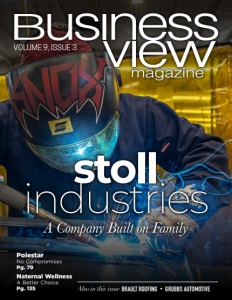Inland Rivers, Ports and Terminals, Inc. (IRPT)
Finding a balanced approach
Business View Magazine interviews Aimee Andres, Executive Director of IRPT, for our focus on Inland Rivers, Ports, and Terminals, Inc in the U.S.
In its capacity as the trade association for the nation’s inland waterway, port, and terminal professionals, Inland Rivers, Ports and Terminals, Inc. (IRPT) provides a national perspective on federal legislative and policy issues affecting ports and terminals through position statements; keeps members abreast of technical, operational, economic, and security issues affecting U.S. inland ports, terminals and river systems; promotes and markets the inland waterway system including ports, terminals and intermodal centers; and unifies the inland ports, terminals, and river systems in support of common objectives. No small feat.
Inland Marine Highways, the inland rivers, move commerce to and from 38 states throughout the U.S., serving as transport ramps to industrial and agricultural centers and facilitating imports and exports at gateway ports on the Coasts. The nation’s rivers deliver vital goods between major gateway ports, establish new trade networks with significant public benefits, and create a foundation for future trade growth. A multitude of ports and terminals service the inland waterways, with a primary focus to grow national economies by providing an access point for multimodal and intermodal transport via river, rail and road. An efficient intermodal freight network is vital to both domestic and international commerce of the U.S. and its contributions to the integrated freight network.
IRPT hosted its 2021 Annual Conference in Biloxi at the IP Casino and Spa on October 18-20, 2021. At that time, the International Association of Maritime and Port Executives (IAMPE) awarded its first Industry Leadership Award to Aimee Andres, Executive Director of the Inland Rivers, Ports and Terminal Inc. (IRPT), for “Outstanding Leadership in the Port and Maritime Industry.” Business View was pleased to speak with Andres about IRPT and her insights into the industry.
BVM: Congratulations on your fantastic award, Aimee! You obviously have a passion for the industry. That being said, can you share some background on IRPT?
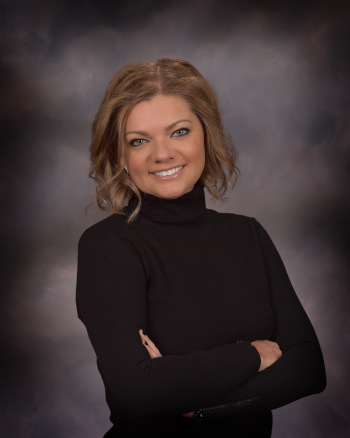
Aimee Andres, Executive Director
Andres: “Thank you, I’m so honored to have received that award!
“Our association was formed in 1974, right before Christmas in the beautiful state of Mississippi. The port directors at that time needed some resources and guidance from those that came before them, so they created this association for networking opportunities, for collaboration between them and other ports directors. Since then, it’s blossomed into a national trade association with over 350 members and still growing.
“I started in August 2013, but my history with the association goes back a bit further, to when my father was president of IRPT in the early 2000s. He was a port director for many years, and when he retired in 2004, he ‘jumped ship’ and started buying short-line railroads. So he is now actually a paying member of IRPT – because nobody gets it for free. 😊 I hope I am making him proud. I feel totally blessed to be working for this association. The port directors, the terminal operators, anyone that works in and around the river industry are just good people doing great work.”
BVM: What major challenge is the industry facing today?
Andres: “The biggest challenge we have as an industry is shipper education. We need to educate more shippers and owners of cargo about the opportunities and the capabilities of our river system to transport freight. Currently, we’re operating under capacity, which means we could take in a whole new influx of cargo, of commodities, of shippers, of industries. Those industries that currently rely on the rivers for transportation are energy, fossil fuels, timber, petroleum, aggregates but we could take on a whole new slew of commodities. One of which is containers.
“I’m super excited and proud of the members in our association who are getting into the container transport business on the river system. They are forward-thinking, innovative leaders that are thinking outside the box – pun intended. Putting those container boxes on a barge. We could put 36, 40-foot containers from different owners on one barge. We can offer a transportation hub. For example, if you had Memphis as a destination for a container-on-barge route, we could have 36 different shipping companies that could utilize the same barge. Just like the airlines, with 150 people on one plane. That’s 150 customers. Essentially, that is exactly what container-on-barge is.
“When we can finally get in front of the shippers and raise awareness as to our capabilities, they’re all for it. Luckily, we have a federal agency called the Maritime Administration Dept. of Transportation that is charged with educating shippers. And we’re currently asking Congress to encourage Maritime Administration to get out there and do just that – educate the shippers about container-on-barge. That’s the most innovative piece of transportation that we’re providing at this point on the river system.”
BVM: Is advocacy one of the main services you provide members?
Andres: “Yes. Advocacy is a large component of what the association does. Not only advocating Congress for funds to improve operation maintenance on the river system, but advocacy towards federal agencies and the services they provide in the transportation sector. IRPT has three full-time and one part-time people on staff and we do all the advocacy work ourselves – take our passion and hit the Hill and we’re loving every second of it. We can actually see some really great work being done.
“The new infrastructure bill will help our industry. Anytime we can improve surface transportation and the transportation network, as a whole, is a good thing. The repaving of an interstate, you may think is direct competition with river transportation but it’s absolutely not. It’s a complementary service. If you can improve an off-ramp into intermodal facilities, like a river transportation facility, you’re increasing the efficiency and the throughput of cargo. So let’s improve our rail. Let’s improve our surface transportation, and let’s improve the operation maintenance of the river system, because it’s all one transportation network.”
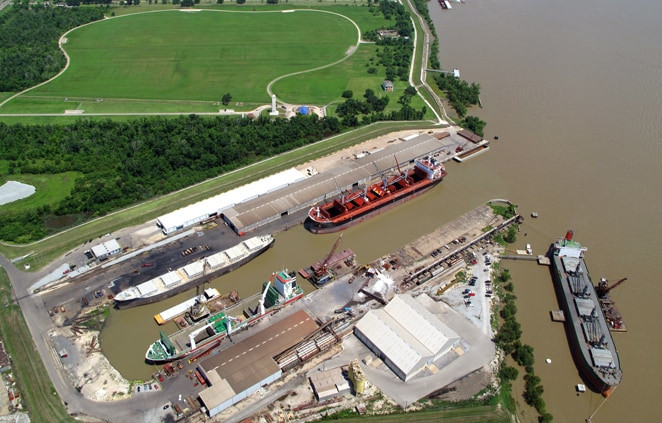
BVM: Is a lack of available skilled workers an issue?
Andres: When we talk about river transportation, we’re intermodal points. So if you’re shipping Chicago to New Orleans, that’s not the final destination. You actually need either truck drivers or longshoremen at that point for first and last mile delivery. We need those workers. Yes, we are under a truck driver shortage – they want to stay closer to home because family is becoming more important in our society. So instead of offering long-haul trucking opportunities, we’re saying first and last mile delivery are regional routes that we can offer, which are much more attractive.”
BVM: Do you provide training and networking opportunities to members?
Andres: “We do. In 2016, we worked with the International Association of Maritime and Port Executives (IAMPE) to develop programs that weren’t then available in the industry. Since then, we’ve held two classes a year, where we educate port directors on everything including business development, river management services, regulations, security – you name it, we’re teaching it. So I’m super proud to be serving on the board of IAMPE, in order to provide the credentials that are now recognized in our industry as the only credential available for port directors.
“We had our annual IRPT in-person 2021 conference in October in Biloxi, Mississippi and I saw a lot of business being done, a lot of networking and relationship building – it was a huge success. Our attendees were so excited to have been there. In-person meetings are resuming and business is good.”
BVM: How will IRPT continue to innovate and be a voice for members in the future?
Andres: “Along with social media platforms, we also have our own mobile app that is all about communication. To be able to say: “There is a rain event happening in Chicago and there’s a surge of water heading your way, so tie up your boats. Caution is needed.” This IRPT mobile app is the first of its kind in our industry to strengthen communications regarding safety and pilotage on the river system. We started that in 2020 during COVID, when everybody was sitting behind their computer instead of being out and about.
“Whether you believe in climate change or not, the river system has always faced high water events. We’ve seen a fluctuation of 30 feet from one week to the next at one dock. That’s the way it’s always been. What has changed is the way our river system is managed. The decisions by the policy makers coming out of Washington have changed. Fish & wildlife and ecosystem restoration have become more prevalent in the conversation, whereas before, commercial navigation and economic growth was at the forefront.
“As an association, we believe we can find a fair balanced approach to operating our river system that incorporates all of those things.”
AT A GLANCE
Inland Rivers, Ports and Terminals, Inc. (IRPT)
What: Trade association for the nation’s inland waterway, port, and terminal professionals
Where: Based in St. Louis, Missouri
Website: www.irpt.net
